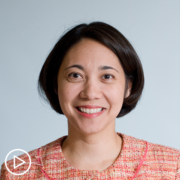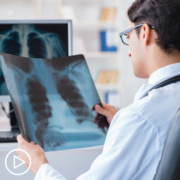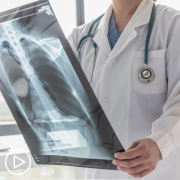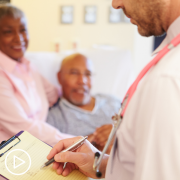What Do Lung Cancer Patients Need to Know to Build a Treatment Plan?
What Do Lung Cancer Patients Need to Know to Build a Treatment Plan? from Patient Empowerment Network on Vimeo.
What do lung cancer patients need to know about treatment options? Expert Dr. Lecia Sequist shares an overview of treatment classes for non-small cell lung cancer (NSCLC), advice for patients, and how each treatment class works against cancer.
Dr. Sequist is program director of Cancer Early Detection & Diagnostics at Massachusetts General Hospital and also The Landry Family Professor of Medicine at Harvard Medical School.
[ACT]IVATION TIP:
“…ask your doctor if immune therapy, targeted therapy, or chemotherapy are appropriate for your cancer. And if not, why not? There’s probably a good reason if they’re not recommending one of those things. But just make sure that you understand why you’re getting the treatment recommendation that you are.”
Download Resource Guide en español
See More from [ACT]IVATED NSCLC
Related Resources:
Transcript:
Lisa Hatfield:
Okay. Dr. Sequist, what are the different treatment options for lung cancer?
Dr. Lecia Sequist:
That’s a really important question. And there are so many treatment options. But I think a way that I often explain it to my patients is sort of thinking in broad strokes and categories. So one way to think of it is there’s three main types of doctors, types of specialists that treat lung cancer. And they each have their own type of treatment that they offer. So there are medical oncologists like myself, who give drugs or different medical treatments. Some of them come in pills, some of them come in intravenous infusions, but they’re all medications. Then there are radiation oncologists who give radiation, which is strong, but invisible X-ray beams that are focused at the cancer to try and kill the cancer cells that way. And then there are surgeons who, that’s some of the most, that’s the one that people usually can understand the easiest.
They’re going to cut out a cancer surgically. And so together, the surgeon, the radiation oncologist and the medical oncologist will work together to come up with the best treatment plan for each patient. Now within my field, which is medical oncology, again, we have lots of different types of medicines that we can give for lung cancer, but most of them fall into three main buckets or types. So one of them is traditional chemotherapy. Chemotherapy drugs, there’s a whole bunch in this bucket. There’s a lot of different chemotherapy drugs. But what they all have in common is that they’re trying to kill dividing cells. They’re counting on the fact that maybe the cancer cells in the body are dividing more often than the healthy cells. And so if it goes in there and kills all the dividing cells, you’re going to kill more cancer than healthy cells.
The second type of treatment that medical oncologists give lung cancer patients is targeted therapy. These are drugs that go after some kind of target or flag or marker on the cancer cell. So a lot of times the oncology team will want to test the cancer to see what markers exist, and then if they have a treatment that goes after those markers, that’s called targeted therapy where you’re giving someone a treatment because of the markers that are seen in their cancer. A lot of those markers are found in genetic testing, but some are found through other types of testing. And then the third bucket of cancer drug treatments is called immunotherapy. And these are treatments that are trying to convince the body’s own immune system to fight the cancer. We’re supposed to be fighting things that are foreign to our body, like infections or bacteria and cancers. But sometimes when a cancer is developed, it’s tricked the immune system into ignoring it.
And so what we try to do with immunotherapy is wake up the immune system, explain what the trick is and say, hey, this is the foreign thing that you’re supposed to go after and try and kill. And so depending on the type of cancer that someone has, where it is in their body, what markers are on the tumor, then your doctors can come up with what they think is the most aggressive or likely to work combination of radiation or chemo or drug treatments that might, that might include traditional chemotherapy or targeted therapy or immunotherapy.
So my activation tip for this question would be to ask your doctor if immune therapy, targeted therapy, or chemotherapy are appropriate for your cancer. And if not, why not? There’s probably a good reason if they’re not recommending one of those things. But just make sure that you understand why you’re getting the treatment recommendation that you are.











